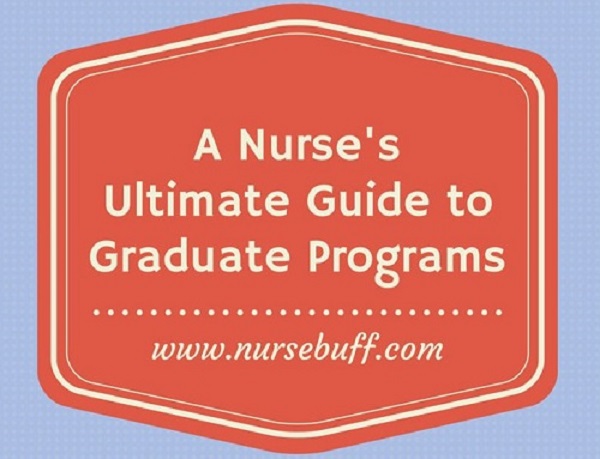Graduating from an entry-level registered nursing (RN) program and passing the NCLEX are very important turning points in a nurse’s life, but these are only the beginning of a successful nursing career. Because of advances in technology, you will be required to broaden your knowledge throughout your career.
Also Read: 8 Things You Need To Know About Online Nursing Programs
If you are one of those who want to develop new skills and learn about nursing innovations, it’s time for you to consider graduate-level education. Nurses with advanced education are highly in-demand and are bound to enjoy more opportunities
Today, the health care system is in need of nurses trained at both Master’s and Doctoral levels, but you do not need to consider a preparatory approach to your education if your goal is the doctorate. Proceeding to doctoral preparation often saves time and expenses, but many students still choose to complete a master’s degree prior to a doctorate. This way, they are given more career options and will be able to balance family, work demands and finances well.
Related Article: Top 10 Best Nurse Anesthetist Programs in the US
More than 500 nursing schools nationwide offer more than 2,000 graduate programs. The following are the graduate nursing programs most commonly available:
I. Master’s in Nursing Programs.
Master’s in nursing programs prepare you for advanced roles in administration, teaching, research, informatics, and direct patient care. You will be able to work as a nurse leader, nurse manager, research assistant or a public health nurse, among others. These are the options to choose from if your goal is to earn a master’s degree in nursing:
A. Entry-Level Master’s Degree.
Entry-Level programs—also referred to as accelerated programs—are perfect for those with a bachelor’s or a graduate degree in a discipline other than nursing. Most of those who want to work as nurse practitioners, clinical nurse specialists, nurse anesthetists and nurse midwives, take up this program.
Time Frame: These programs often take about two to three years to complete with baccalaureate-level content and initial Registered Nurse Licensure completed during the first year.
B. RN to MSN.
Designed for nurses with associate degree but still aspire to pursue a Master’s degree, these programs are often fast track and usually allow working RNs the choice to advance nursing education without having to sacrifice their job.
Time Frame: These take about two to three years to complete with certain requirements depending on the institution you attend and based on your previous course work.
C. Baccalaureate to Master’s Degree.
These programs are designed for students with undergraduate nursing knowledge. Most schools grant the Master of Science in Nursing Degree (MSN) while others offer Master of Nursing (MN). All these degrees prepare students for the same level of competency.
Time Frame: Most programs require 18 to 24 months of full-time study, but the requirements and course work vary by institution.
D. Dual Master’s Degree Programs.
Many institutions offer you the opportunity to earn two Master’s degrees at once, incorporating graduate nursing courses with another field. Examples include those related to business (MSN/MBA), public health (MSN/MPH), and public administration (MSN/MPA).
E. Post Master’s Certificate Programs.
Perfect for master’s program graduates who still want to broaden their nursing knowledge, these are offered in most institutions, and usually include nursing education, leadership, informatics, and specialty practice among many others.
Additional Resources:
About the master’s degree in Nursing
Frequently asked questions about Masters in Nursing
II. Doctoral Nursing Programs.
Many schools are starting to offer doctoral nursing programs because they will be able to give nurses the opportunity to get better jobs and salary options. These programs focus on preparing graduates for leadership positions in research, clinical care delivery, patient outcomes and system management.
Nurses who have doctoral degrees are qualified to work in health administration, clinical research and advanced medical practice. These days, a nursing student can choose from doctoral programs that are focused on research, which grant the degree of a PhD in Nursing or a Doctor of Nursing Science, or on practice, which grant the degree of a Doctor of Nursing Practice (DNP).
Those seeking doctoral or post-doctoral nursing programs must consider these options:
A. Fast-Track Baccalaureate to Doctoral Programs.
Providing a pathway that is efficient for baccalaureate graduates, these programs instill strong clinical experiences that are available to both nurses in practice and new graduates. You can even choose to focus either on research or practice.
A fast track doctoral degree is one way of speeding up the path to a Ph.D., considering that you are given the opportunity to enter the program without having to earn a master’s degree beforehand.
Time Frame: Fast-track doctoral programs may usually be completed within three to four years, depending on the requirements of the institution that you attend.
B. Doctor of Nursing Practice (DNP).
The DNP program centers on building skills and knowledge in the areas of innovation, practice improvement, health policy, leadership in healthcare delivery and quality improvement, and healthcare expertise for advanced nursing education. It emphasizes interdisciplinary collaboration among community leaders, policy makers, faculty and hospitals.
The program has been designed to provide students with role competence necessary in providing care to individuals and families. More than 150 nursing schools offer both post-baccalaureate and post-master’s DNP programs and more than 100 new programs are being developed.
C. Research-Focused Doctorate.
Oriented towards developing high level of expertise in research, the Doctor of Philosophy (PhD) represents the highest level of formal education for any career in research.
Successful graduates of the program will be able to serve as leaders of the profession. More than 120 nursing schools offer a research-focused doctorate at the moment.
Additional Resources:
Understanding the Doctor of Nursing Practice (DNP): Evolution, Perceived
Benefits and Challenges
III. Preparation for Specific Nursing Roles.
The following are career choices for graduates of master’s and doctoral programs. This is indeed an intensive list, but your graduate education may take you farther.
Advanced Practice Registered Nurses (APRNs).
The demand for APRNs is constantly growing as the American healthcare system is actively working to accommodate more and more advancements throughout the years. APRNs serve in leadership roles in all levels of the healthcare management administration. They work in focused roles as informaticists, researchers, and legal consultants.
APRNs who serve outside the clinical environment are vital to the efficiency of healthcare delivery and services. Those considering a career as an APRN may choose from one of four recognized roles:
A. Nurse Practitioners (NPs).
NPs are the largest part of the APRN workforce and are vital in providing primary and acute care. They also perform comprehensive and focused physical examinations, diagnose and treat common acute injuries and educate patients and their families.
NPs are usually trusted with higher-level duties than RNs and are expected to provide basic medical care when physicians are not available.
B. Clinical Nurse Specialist (CNS).
Other than caring for patients and providing consultations to nursing staffs, Clinical Nurse Specialists are also responsible for educating individuals, families, groups and communities. They specialize in a number of areas, such as adult health, acute and critical care, and community health among others.
C. Certified Registered Nurse Anesthetists (CRNAs).
CRNAs carry a heavy load of responsibilities and are expected to work with other members of the healthcare team to ensure that the patient knows what to expect after a procedure.
READ: How To Become A Nurse Anesthetist – A Complete Guide
A CRNA provides anesthetics to patients in collaboration with surgeons, anesthesiologists, dentists and other healthcare professionals and is responsible to ensure the patient’s recovery from anesthesia after the surgery is completed. The usual work settings for a CRNA are hospitals, surgery centers, clinics, dental and physician offices.
D. Certified Nurse-Midwives (CNMs).
CNMs provide family-centered primary healthcare to women throughout their reproductive lives. Aside from delivering the baby and providing prenatal care, they also provide emotional support for pregnant women. Settings usually include private homes, hospitals, birthing centers and ambulatory care settings.
IV. Preparing to Become an APRN.
Before becoming an APRN, you must first complete an accredited graduate program, pass a national certification examination, and acquire a license to practice in one of the four APRN roles.
Although master’s level programs are available, the doctoral degree (DNP) is starting to become the standard for preparing APRNs for the current nursing practice.
A. Nurse Researchers.
Nurse researchers need a Bachelor of Science degree in nursing and a license to practice. Some employers prefer nurses with a Master of Science in Nursing and some relevant experience. Certification programs usually include health informatics, descriptive and inferential statistics, and research for evidence-based practice among other courses.
Aside from identifying research inquiries, designing and conducting activities, and analyzing and translating findings to implement new practices, Nurse Researchers are expected to assist in finding solutions to clinical programs and strategies to deliver healthcare services in an efficient way.
B. Nurse Educators.
Aside from developing and planning student curricula, a nurse educator evaluates student progress as well. They are responsible for preparing new nurses and advancing the development of practicing clinicians.
Nurse educators must possess strong communication skills and a high level of cultural competence, as well as a solid clinical background. Also, they need to be resilient and must be flexible enough to easily adapt curriculum and teaching methods in response to changes in nursing science.
Nurse educators’ preparation for roles varies by position and teaching site. Those with master’s degree usually serve as clinical preceptors, staff development educators, and faculty in associate degree and allied nursing programs.
C. Clinical Nurse Leaders (CNLs).
The role of a clinical nurse leader focuses on managing and implementing care plans for patients. They decide which care plans are best implemented and which ones are not. CNLs are usually found at the bedside providing direct patient care in settings where they collaborate with the members of the healthcare team.
D. Public Health Nurses.
A public health nurse works with the whole community instead of just working with one patient at a time like most nurses do. This enables public health nurses to educate people about issues on health and safety, and increase everyone’s access to care.
Their roles are to monitor health trends and identify risk factors to varying communities, set priorities for interventions that will benefit people in the community, improve people’s access to health services, and educate and provide direct health care services to vulnerable populations.
Public health nurses are expected to work well in collaboration with other health care members and be sensitive to the cultural differences of different communities.
E. Nurse Informaticists.
Nurse Informaticists work hard to translate the needs of patients and staff into computer programs, so that the technical support can understand and enhance the productivity of nursing care.
Nurses who want to work in the field of nursing informatics are required to earn a master’s degree in nursing informatics or in a related field. Their role is to look for ways to simplify and enhance documentation using advanced information technologies.
F. Other Roles.
The Nursing profession is active and quickly evolving every day. It gives nurses with graduate degrees limitless career opportunities. Not only can nurses take the roles mentioned above, but they can also be specialists in school nursing, genetics, genomics, case management and many others.
Some nurses are even presently working as authors, consultants, legislators, communicators, and military officers. These are only but a glimpse on what nurses can do, especially those who are willing to work hard to become successful.
About the Author: Mary Elizabeth Velarmino Francisco earned her Bachelor of Science in Nursing Degree from the Ateneo de Zamboanga University, Philippines. She is always happy to share her passion for writing and blogging. With coffee running through her veins, she enthusiastically battles each day, one article at a time.



















